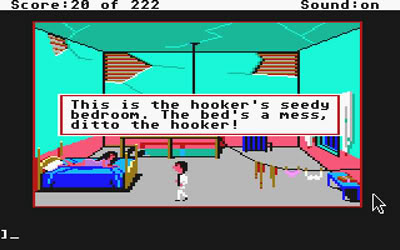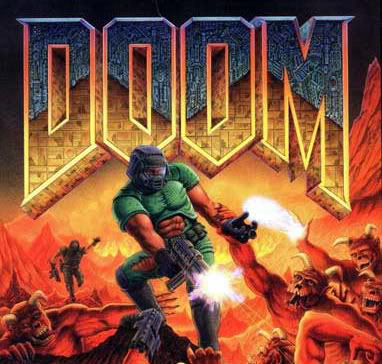This post has not been edited by the GamesBeat staff. Opinions by GamesBeat community writers do not necessarily reflect those of the staff.
I was reading a great article here on Bitmob called "My four-year-old son plays GTA" by Matthew Orona, and I started to think back on my own childhood and my experience with gaming in my most formative years.
Eventually, I was able to sneak in there when nobody was looking, and what I saw was my grandfather’s IBM PC. The screen displayed what was an interesting image to a curious mind: a greenish, monochrome, and pixelated guy standing in front of a bar called Lefty’s.

Yes, the first game I ever played was Leisure Suit Larry in the Land of the Lounge Lizards. My dad saw my interest in this game and sat down with me to play. Off course I didn’t get to play or see all of the game. We would usually just walk Larry around and type “open door” or “call taxi” and that was fun enough for me.
Besides the obvious effect this moment had on me (over twenty years later I’m still gaming), it also spurred my interest in learning a foreign language.
English was definitely foreign to me — as foreign as the interactive medium was. I had to learn English to experience games properly because localization for games had never even been attempted where I grew up. I played some NES games that really needed no language skill at all, but I wanted more. I wanted to play Civilization, SimCity, and X-Com. I never owned a NES, but a PC was brought into my childhood home early on. In the DOS era, it was even more important to know some English.
By the time I started to study English at school, I already knew how to read and write it. If I remember correctly, English was introduced to our school curriculum in fith grade. Even though I was only ten at the time, I was definitely way ahead of the curve. And I stayed ahead.
When the teacher asked us to learn the basic verbs, I was reading game manuals. When the teacher asked us to write simple sentences, I was writing down notes about the inners workings of a Doom 2 level editor. When the teacher asked us to read children’s books, I was reading novels.
 My father had also introduced me to Doom a few years before this. He felt I was developed enough to start understanding the difference between pixelated blood spatters and real-life violence. We always played together, and I was never left playing a violent game or watching a violent movie without supervision until I was older. Whether it was intentional or not, Doom taught me to think of violence as bad.
My father had also introduced me to Doom a few years before this. He felt I was developed enough to start understanding the difference between pixelated blood spatters and real-life violence. We always played together, and I was never left playing a violent game or watching a violent movie without supervision until I was older. Whether it was intentional or not, Doom taught me to think of violence as bad.
To this day, the topic of violence in video games brings up memories of my father narrating the games I played and instilling proper values and morals into my young mind. I often wondered why people got so upset about violence in entertainment because I failed to see, at the time, that people relied on games and television as babysitters. Instead of actually doing some parenting of their own, too many parents used entertainment as means to buy some time for themselves. I think that they missed out on the opportunity to use games as a tool to teach their children.
It’s inevitable that kids will discover violence, often through the media, earlier than most parents would prefer. I think it’s in our nature to believe that our kids will just stay innocent and oblivious to the bad nature of humanity. Our role as parents is to educate them and do what we can to make sure that everything they experience has a lesson to draw from. This seems to elude so many parents. They want to hide everything from their children and hope that they never need to deal with the ugly side of real life. I’m not saying it’s okay to sit children in front of the TV and make them watch you play Call of Duty, but kids will find ways to see what they want to see.
Video games are great for teaching as well as entertaining, but the activity must be supervised and the experience should be guided, especially for younger children. When I think back on my childhood, I think of all the games I played and how, on many occasions, they were used as tools as well as entertainment. Still, I feel like the medium is somewhat under-appreciated as a learning tool, but we are on the right track.
If you're interested is pursuing games as tools for learning, here are some examples of video games making their way into the curriculum of formal educational institutions:
Minecraft Teacher Joel Levin uses Minecraft to teach 2nd grade children computer skills and social interaction.
Michael Abbott (the brainy gamer) teaches a required course about what in means to be human at Wabash College, where Portal is on the syllabus.
I hope we continue to find more value in video games beyond the means of pure entertainment.
